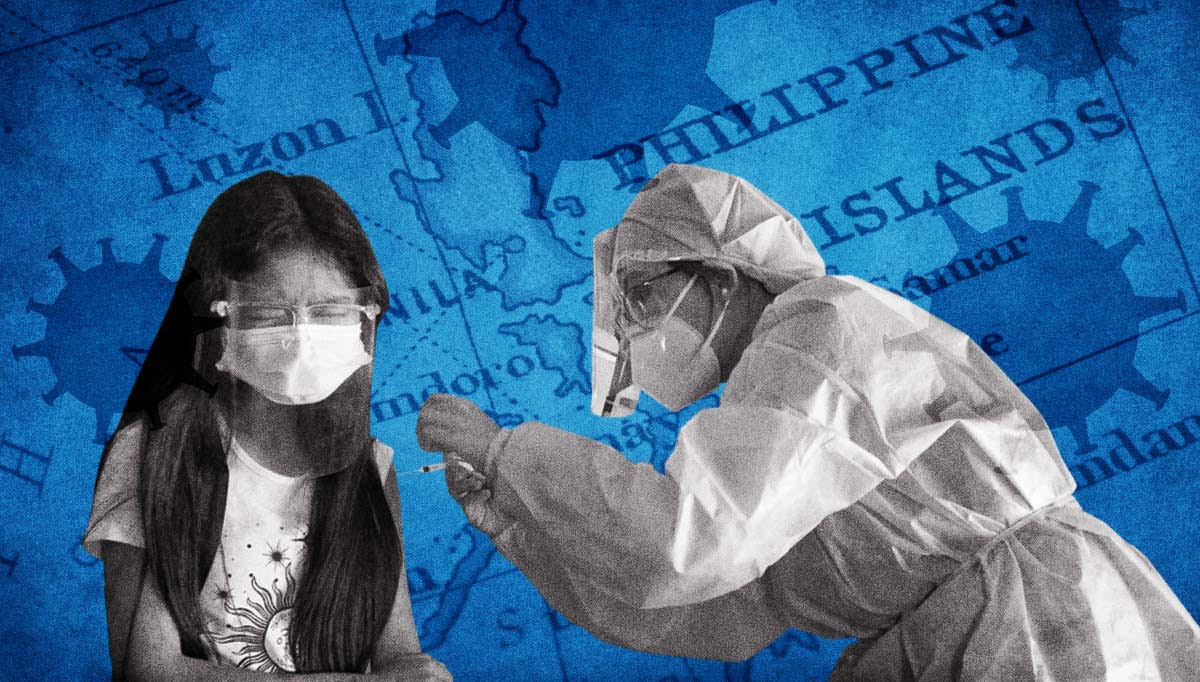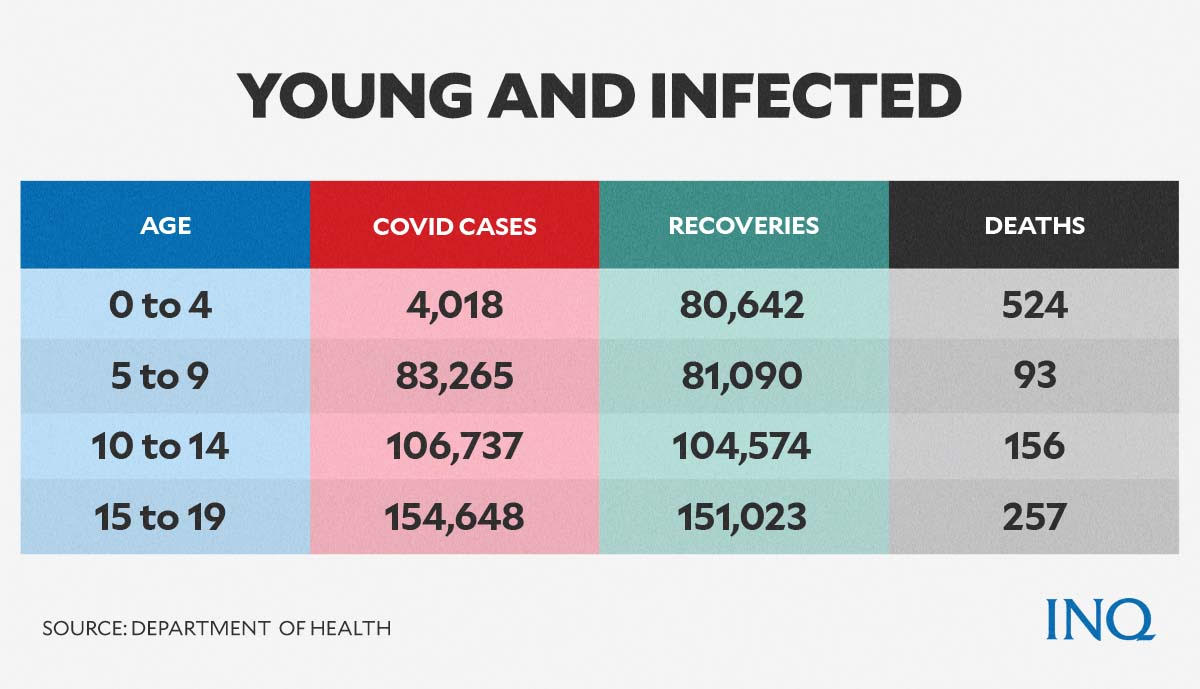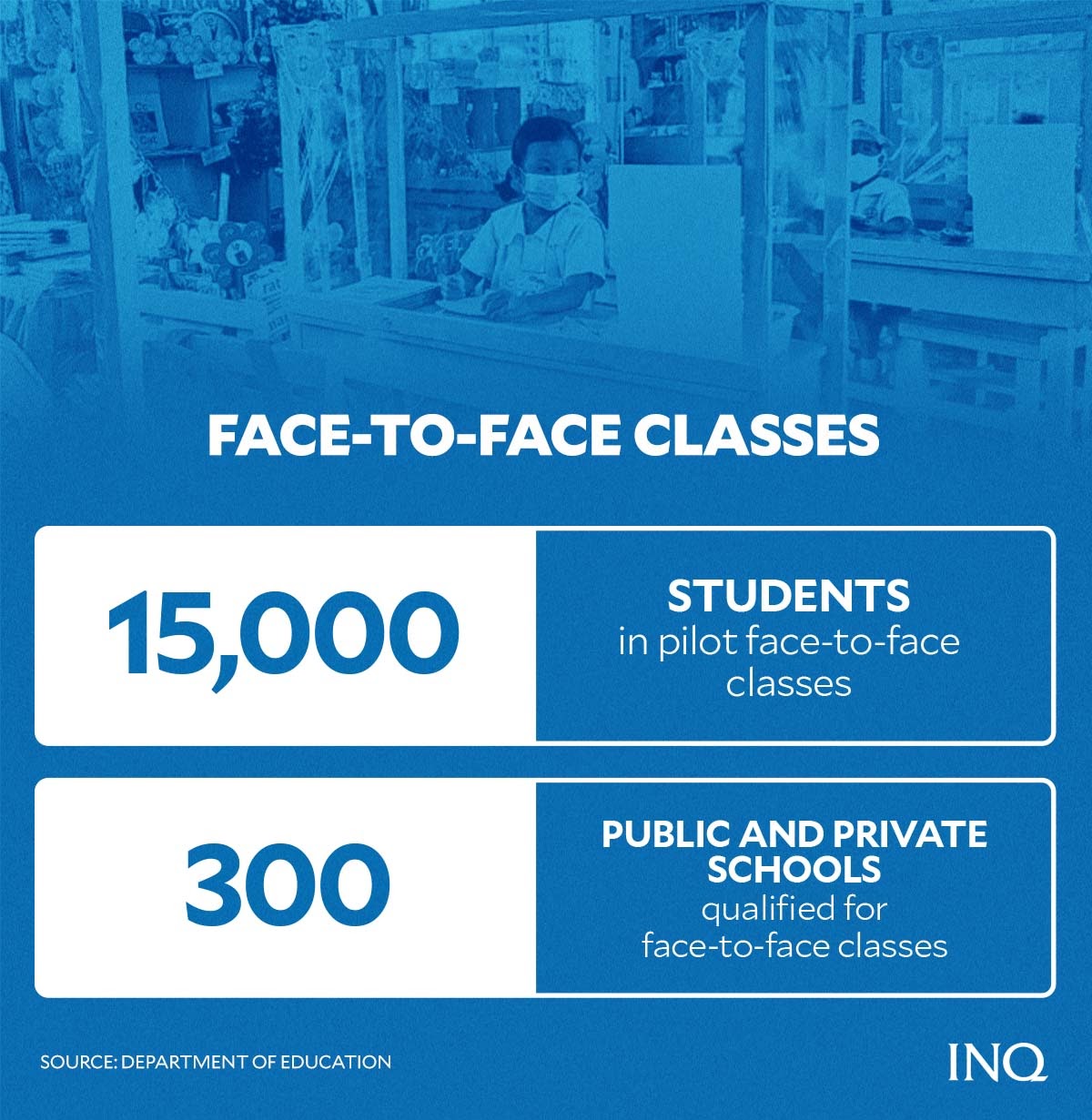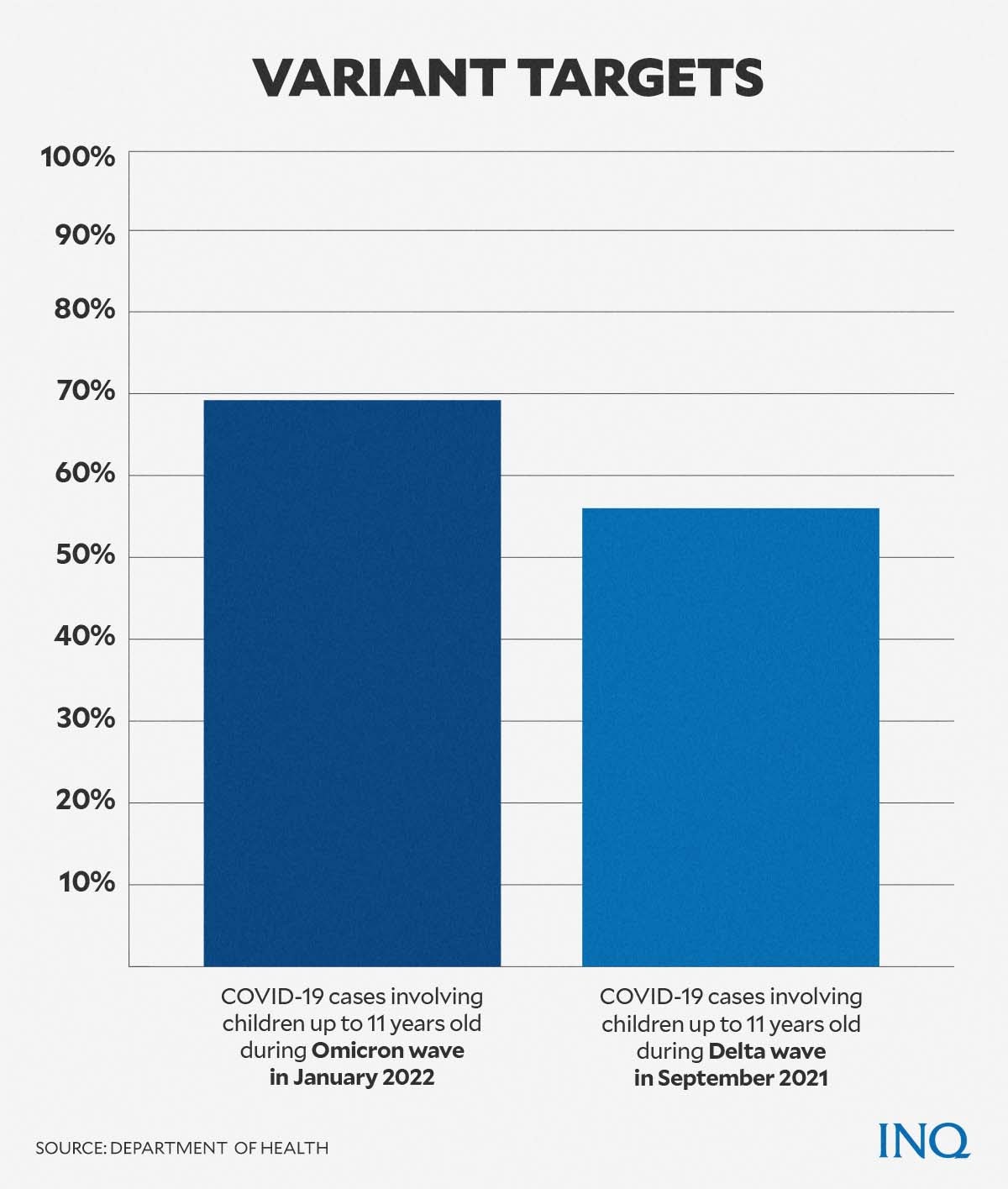‘Resbakuna Kids’: Easing the way to face-to-face classes

FILE PHOTO
MANILA, Philippines—The program to vaccinate children between 5 to 11 years-old “beautifully blends” with the Department of Education (DepEd) effort to expand face-to-face classes, which COVID restrictions ground to a halt.
This was how Education Secretary Leonor Briones viewed the vaccination of children, expressing “strong and complete support” for the Department of Health’s (DOH) “Resbakuna Kids.”
Last Feb. 7, the program finally started after it had been moved from Feb. 4 due to “logistical challenges.”
The launch of pediatric vaccination followed a “stringent review process” by four independent expert groups and endorsement by the Philippine Pediatric Society (PPS) and Pediatric Infectious Disease Society of the Philippines (PIDSP).
READ: Pediatric groups reiterate support for COVID vaccination of aged 5 to 11
“Let us be clear and unequivocal: COVID-19 disease directly affects children and may lead to serious consequences. Children 5 to 11 years of age are at risk of severe illness from COVID-19,” the PPS and PIDSP said in a statement.
Article continues after this advertisement
Graphic: Ed Lustan
The first day of the vaccination was held at the Philippine Heart Center, National Children’s Hospital, Philippine Children’s Medical Center and SM North Edsa Sky Dome in Quezon City.
Article continues after this advertisementResbakuna Kids was also launched at the Fil-Oil Flying V Arena in San Juan City and Manila Zoo in the city of Manila. It will also be expanded to different regions as the Philippines was expected to receive more doses.
Last Jan. 18, vaccine czar Carlito Galvez said 15.56 million children aged 5 to 11 were expected to get vaccinated. He said there are 780,000 initial Pfizer-BioNTech COVID-19 vaccine doses.
Pfizer-BioNTech’s was the only vaccine that has received an Emergency Use Authorization from the Philippine’s Food and Drug Administration.
Galvez said 1,632,000 doses will also be delivered. These are part of the 7.5 million doses that were bought by the government which the Philippines is expected to receive until March.
Galvez said the government already ordered 10 to 15 million doses to completely vaccinate children between the ages of 5 and 11. Last year, it was the turn of children between the ages of 12 and 17 to get vaccinated.
Key to expand physical classes
Since the DepEd was expected to transition to limited face-to-face classes for the school year 2022-2023, the vaccination of children, the DepEd said, was seen to strengthen the confidence of parents and children.
READ: Pediatric vaccination hesitancy by parents: Science provides answers
Education Undersecretary Nepomuceno Malaluan said on Jan. 28 that 14 million basic education learners with ages 5 to 11 are eligible for Resbakuna Kids.

Graphic: Ed Lustan
The DOH said 7,416 children received the initial dose of the vaccine on Monday (Feb. 8). The government encouraged parents to register their children and have them vaccinated.
READ: 7,416 kids get COVID-19 vaccination on first day of gov’t drive
Last Jan. 26, the PIDSP said 58 percent—or 6.2 million—of the 10.7 million children with ages 12 to 17 had already been completely vaccinated against COVID.
READ: 58% of target population of adolescents in PH fully vaccinated vs COVID-19
Galvez, while saying that it’s already time to give children protection against COVID, stressed: “We are ensuring the health and safety of children as we begin to reopen our schools and face-to-face classes.”
Briones said when deciding what form education should take, the health and safety of children would always be considered because, most especially, they should be happy with their learning experience.
She said that last year, when 15,000 learners were engaged in the pilot conduct of face-to-face classes in the Philippines, not a single COVID case was recorded.
Vaccinated learners ‘preferred’
Last Jan. 17, as President Rodrigo Duterte heeded the recommendation for the “progressive expansion of limited face-to-face classes,” the DepEd set these directives:
- Expansion schools have been validated as compliant with the standards of School Safety Assessment Tool.
- Schools should be in areas on Alert Levels 1 and 2 based on the periodic risk assessment by the DOH.
- Schools may already include other grade levels based on the capacity of schools.
- Schools or divisions should have the concurrence of the local government unit and village officials
- Students participating in the face-to-face classes should have the written consent of their parents.
- Schools are given flexibility in contact time for teaching and learning, provided that meals are not taken except when there’s a managed recess.
- Only vaccinated teachers may participate, and vaccinated learners shall be preferred.
The DepEd said 67.02 percent of 970,694 teaching and non-teaching personnel, who are eligible for vaccination, had already been completely vaccinated against COVID.

Graphic: Ed Lustan
As the government’s Resolution No. 159–A placed more provinces and regions on the lower Alert Level 2, there are 304 public schools that are qualified to have limited physical classes:
- 118 schools in Metro Manila will start on Feb. 9
- 12 schools in Batanes will start on Feb. 7 to 11
- 106 schools in Bulacan will start on Feb. 21
- 33 schools in Cavite will start on Feb. 14
- 21 schools in Rizal will start on Feb. 14
- 3 schools in Southern Leyte will start on Feb. 7
- 7 schools in Maasin City will start on Feb. 14
- 6 schools in Biliran City will start on Feb. 14
Keeping children safe
Dr. Beverly Ho, head of the Health Promotion Bureau of the DOH, said the bureau recommends the vaccination of children since it lessens the potential of contracting COVID.
“When there were no vaccines yet for children with ages 5 to 11, we are doing all we can to keep them safe. Now that we already have the opportunity to give them additional protection, why not?” she said.
“While the rest of the family was already vaccinated, the possibility for a child to contract the disease is lesser if he or she is vaccinated,” she said. This was the reason her bureau recommended Resbakuna Kids.

Graphic: Ed Lustan
The DOH said 71.8 percent of the 7,260 severe and critical cases from Nov. 5, 2021 to Feb. 6, 2022 were individuals who were not vaccinated and initially vaccinated against COVID-19.
There were 6,254 deaths from Nov. 5, 2021 to Feb. 6, 2022 and 77.4 percent were individuals who were not vaccinated and initially vaccinated against COVID-19.
Last Friday (Feb. 4), the DOH said 69.2 percent of the January 2022 (Omicron wave) COVID-19 cases were children with ages 0 to 11 years old. It was only 56 percent in September 2021 (Delta wave).
Since COVID hit in 2020, there were already 428,668 cases among children with ages 0 to 19. There were 417,311 recoveries and 1,030 deaths, the DOH said on Monday (Feb. 7).
- 0 to 4 years old
Cases: 84,018
Recoveries: 80,624
Deaths: 524
- 5 to 9 years old
Cases: 83,265
Recoveries: 81,090
Deaths: 93
- 10 to 14 years old
Cases: 106,737
Recoveries: 104,574
Deaths: 156
- 15 to 19 years old
Cases: 154,648
Recoveries: 151,023
Deaths: 257
Dr. Mary Ann Bunyi, president of PIDS, said the vaccine gives protection since when a child gets sick, it will not be severe and he or she will not need immediate hospital care and will not develop complications.
“This is also a way for children to do what they have been typically doing,” she said at the Resbakuna Kids Orientation on Pediatric Vaccination on Tuesday (Feb. 8).
What should you know?
The DOH has laid down some facts regarding the Resbakuna Kids.
It said that while there will be one brand (Pfizer) for children aged 5 to 11 and 12 to 17, the pediatric vaccines will receive different formulations which will be administered in two doses, 21 days apart.
These individuals are not yet allowed to get vaccinated:
- Children with ages 5 to 11 who are still in isolation because of COVID-19
- Children who are 4 years old and below
- Children who have allergy to polyethylene glycol or PEG and polysorbate
If a child has an existing illness, like cardiovascular diseases and chronic respiratory diseases, he or she needs to get an advice and medical certificate from his or her doctor.
Here are the other diseases which the DOH said would require a medical certificate: medical complexity; genetic conditions; neurologic conditions; metabolic/endocrine disease; obesity; HIV, tuberculosis; renal disorder; hepatobiliary disease; and the immunocompromised.
RELATED STORY: Kids in Manila line up early to get COVID -19 vaccine shots
TSB
For more news about the novel coronavirus click here.
What you need to know about Coronavirus.
For more information on COVID-19, call the DOH Hotline: (02) 86517800 local 1149/1150.
The Inquirer Foundation supports our healthcare frontliners and is still accepting cash donations to be deposited at Banco de Oro (BDO) current account #007960018860 or donate through PayMaya using this link.